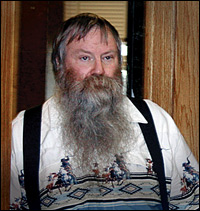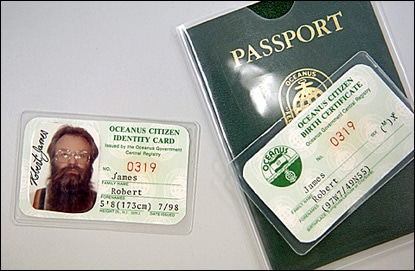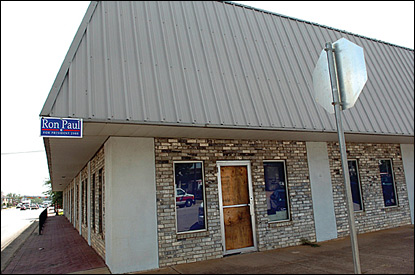‘Sovereign Citizens’ Outfit Raided in Jacksonville, Texas
Raids in East Texas open up a case that shows the 'sovereign citizens' movement still thrives in certain quarters
About six years ago, a man who said he was a dentist established what he claimed to be a church in Jacksonville, Texas, a city of about 14,000 in the rolling hills two hours southeast of Dallas. The church was located in a large building on Main Street that also housed his dental practice. He called this church the House of Israel. Two years after its founding, an enigmatic newcomer to Jacksonville — whose most distinctive feature was his long, unruly beard — moved into the building, bringing with him what he professed was a prison ministry, the Matthew 25 Mission.
Only the Matthew 25 Mission (not to be confused with a genuine group of the same name) wasn't really a prison ministry, and the House of Israel wasn't really a church. Instead, it was a crash pad for fugitives from justice and a secretive guild of "sovereign citizens" — part of a movement that remains alive and well despite seeming to fade in the late 1990s.
During three raids of the House of Israel building this spring, police found a large stash of drugs and reams of racist, anti-Semitic, neo-Confederate and antigovernment materials. Among them were publications and videotapes extolling Oklahoma City bombers Timothy McVeigh and Terry Nichols as patriots.
"I've been into a lot of churches in my life," Jacksonville Police Chief Reece Daniel told the Intelligence Report. "I've never walked into one that was full of alcoholic beverages, full of pornography, and full of hate literature."
The House of Israel's troubles with the law began the night of April 7, when a Jacksonville police officer responded to a call about two suspicious men on the street near the church's entrance. One of them ran but was caught later that evening. Both men refused to reveal their names or birth dates. They said they were members of the House of Israel, which afforded them special, above-the-law status. The police disagreed, arresting both men for refusing to identify themselves to a law enforcement officer.
After determining that the men were in fact David Baugh and Stephen Jackson, both of Missouri, police learned that Jackson, who'd been staying at the House of Israel, was wanted on federal weapons charges. Jackson, 50, had been indicted January 23 on felony counts of unlawfully transporting firearms and possessing an unregistered silencer. On April 8, the day after his arrest in Jacksonville, the Bureau of Alcohol, Tobacco, Firearms and Explosives took Jackson into custody. (Jackson pleaded not guilty to both counts on May 5).
Baugh, who was also staying at the House of Israel, was initially released. A short time later, though, police learned that he was wanted for parole violations in Missouri, where he'd served time for several convictions for driving without a license.
For more than 15 years, court records show, Baugh had refused to register his vehicles or obtain a driver's license. In lieu of state-issued license plates, he used homemade plates emblazoned with the words "PRIVATE" and "KINGDOM OF YAHWEH."
While he was incarcerated in Missouri, Baugh sued police, lawyers and others involved in his convictions for $10 million. According to a federal judge's 2007 order dismissing the case, Baugh claimed he was a "sovereign person" and that Missouri law did not apply to him. In a separate, unsuccessful petition filed in 2005 challenging his conviction, Baugh stated that he had established the "Kingdom of Yahweh, Embassy and Sanctuary" near Sullivan, Mo., and that the state's laws unjustly prevented him from carrying out his work as an evangelist.
Three years later in Jacksonville, Baugh's ministerial work was about to be interrupted again.
Suspicious Links
Jacksonville police went looking for Baugh at the House of Israel on May 15. When no one answered their knock, they forced their way inside, where they not only found Baugh, but also thousands of prescription pills, mostly antibiotics and painkillers. The pills had been packaged 10 to 15 apiece in plastic baggies. Some of the bags were labeled "Republic of Texas," the name of an antigovernment separatist group that claims Texas was illegally annexed by the United States in 1845. One of its leaders, Richard McLaren, is serving 111 years in prison for his role in a weeklong 1997 standoff with several hundred Texas Rangers after his followers kidnapped a neighbor couple at gunpoint.
"This group [the House of Israel] is the Republic of Texas wrapped in an ancient Hebraic religion of their own making," said Daniel, the police chief.
Baugh denied in a letter this spring to KETK News, a Tyler, Texas-based NBC affiliate, that the House of Israel was "an offshoot" of the Republic of Texas. He wrote: "The House of Israel is a Christian ministry devoted to humanitarian service."
But the pills weren't the House of Israel's only apparent link to the Republic of Texas. House of Israel member Robert Fox — the man with the Old Testament beard who ran the Matthew 25 Mission — was later found to have passed himself off as a lawyer and worked on a civil lawsuit for a woman whom law enforcement officials believe is treasurer of the Republic of Texas, Jacksonville Police Detective Jason Price said.
Furthermore, investigators found that Barry Brooks, the dentist who originally started the House of Israel, had been a member of the Republic of Texas. By the time police raided the House of Israel building, however, Brooks had begun serving an eight-year state prison term. That sentence was imposed in April 2007 after he was convicted of two counts of practicing dentistry without a license. (Brooks contended that his involvement with the House of Israel exempted him from state regulations. According to records of a 2005 federal court hearing, Brooks claimed that "he was working under the ministry of Christ's church and did not need a license from the Texas State Board of Dental Examiners because he was ministering to God's creatures by fixing the temple. The Defendant argued that, according to scripture, the human body is a temple.")
Brooks had previously been convicted in 2002 of three counts of failure to file income taxes. In a 2003 petition alleging that his conviction was invalid, Brooks made several nonsensical arguments, all of them commonly used by the "sovereign citizens" who proliferated in the 1990s. Among other things, he claimed that he was a citizen of Texas rather than the United States; that paying taxes would unfairly require him to enter into a contract with the U.S. government; that the United States was insolvent because its currency consisted of paper rather than gold or silver; and that the use of his name amounted to trespassing on private property. A federal judge upheld his conviction.
Vexatious Litigation
A week after Jacksonville police confiscated the pills, they raided the House of Israel again. This time they arrested Fox, charging him with four misdemeanor counts of possessing dangerous drugs. Fox, who claimed that the drugs were remnants of Brooks' dental practice, bonded out of jail after a friend posted his $60,000 bail. But Fox, who police believe is around 59, wouldn't be a free man for long. As in the first raid, police found signs of illegal activity — this time, documents that made them suspect Fox was receiving payments for providing legal advice, even though he's not licensed to practice law.
Citing the ongoing investigation, Detective Price declined to say how much money police believe Fox received from his phony law business. But he said that Fox was representing clients in numerous states, including California, Florida and Pennsylvania. And when Fox — who in 2006 was declared a "vexatious litigant" by a Texas court — came across a prospective client that he found particularly appealing, he'd offer his legal services. For instance, he appears to be the author of an affidavit, addressed to the correct court in Virginia, calling for the release of John Walker Lindh, the American citizen who fought for the Taliban in Afghanistan before his capture by U.S.-allied troops in 2001. He wrote to Mel Gibson, saying he wanted to defend the actor after his anti-Semitic rant during a traffic stop for DUI. Fox also had bigger plans: His Matthew 25 Mission had purchased a building in downtown Jacksonville near the House of Israel headquarters. He planned to open a legal training center there where students could, according to a fundraising letter, learn how to "escape the tentacles of the bar terrorists." Police don't believe that the building was ever occupied.
On June 11, police went to the House of Israel a third time. Fox, who was out on bail, came to the door. He was arrested on two misdemeanor counts of practicing law without a license. Fox was released after posting a $30,000 bond. It was mainly during this third raid, however, that police seized thousands of documents — including five filing cabinets, nearly 30 boxes and seven computers — showing that Fox is a prominent figure in the antigovernment "Patriot" movement. He sold videotapes of one-day and two-day seminars he held in California and Las Vegas, respectively. Fox also gave lectures in Texas. For a fee of $175, participants supposedly could learn how to represent themselves in court and how to outwit the legal system. During one seminar, Fox said he had visited Waco, Texas, seven times in an effort to stop the deadly 1993 siege of the Branch Davidians, whom he believed were being persecuted by the U.S. government.
A Thin Veil
Through Fox's so-called prison ministry — which appeared to do little or no actual ministering — prisoners could order books outlining fringe legal strategies. "The majority of the books on the list did not deal with any kind of spiritual redemption," Detective Price told the Intelligence Report. "It was how to combat the legal process."
He was also recruiting prisoners as clients for his fake legal practice. "His prison ministry was a very, very thinly veiled cover for a law practice that Fox was conducting through his prison contacts," Price said. In mid-July, Fox was charged with barratry, or improperly trying to solicit business for his legal practice, a felony under Texas law. By then, however, the man had vanished. Police believe he absconded to the Austin, Texas, area.
It wasn't the first time Fox had disappeared. An investigation by the Jacksonville Police Department revealed that Fox — whom Price described as charismatic, intelligent and meticulous — began life in Canada as Robert Nicholas Fotti. When he was 15 or 16, his father killed his mother before committing suicide, according to information Fox later gave the U.S. Immigration and Naturalization Service. He graduated from high school and attended college, where he started a business that provided light and sound systems for events. In the late 1970s, he ran a red light in Manitoba and killed two motorcyclists, a father and son. He was first acquitted of dangerous driving, then found guilty when the case was appealed to a higher court. Facing prison time in Canada, he fled to Dallas, drawn by a Biblical reference to three cities of refuge on each side of the Jordan River. Apparently, he chose Dallas as his city of refuge on the west side of the Mississippi River. Police aren't sure how he supported himself in Dallas.
Although Fox initially lived in the United States illegally, he became a legal permanent resident under a 1986 law that granted amnesty to eligible immigrants who had entered the country illegally before 1982. Fox nonetheless chose not to receive a Social Security number or to become a U.S. citizen. Also during the 1980s, Fox changed his name from Robert Nicholas Fotti to Robert James Fox through a court in the Bahamas. Around 2004, he moved to Jacksonville and set up shop in the House of Israel.
During the raids, police found tracts with titles such as The White United States of America and The True Confederacy, Daniel said. They also seized fake IDs issued to Fox under the name "Robert James," including a driver's license, birth certificate, passport and license plates. The documents identified him as a citizen of Oceanus, a nonexistent country.
As this issue went to press, Fox remained at large. And that's worrisome to Jacksonville police. They say Fox is a dangerous man who has already inspired others to take up his cause, like Baugh and Jackson.
"He might not be the lightning," Daniel said, "but he's certainly the lightning rod."




